I want Last Five Record from table. Condition is Column contains duplicate and null values.
CREATE TABLE [dbo].[Student] (
[Student_Name] [VARCHAR](50) NULL
)
INSERT INTO Student
VALUES
('Mukesh')
, ('Vinod')
, ('Mukesh')
, (NULL)
, ('Shree')
, ('Raj')
, (NULL)
, ('Abhijit')
, ('Raju')
, ('Sharon')
, ('Ashok')
, ('Meena')
, ('Mukesh')
, (NULL)
SELECT * FROM Student
Note: I want Last Five Record From Above Table

